Lance Wyman: The Visual Diaries 1973—1982 - Kickstarter Fund Project #33
Every week, the Seattle Review of Books backs a Kickstarter, and writes up why we picked that particular project. Read more about the project here. Suggest a project by writing to kickstarter at this domain, or by using our contact form.
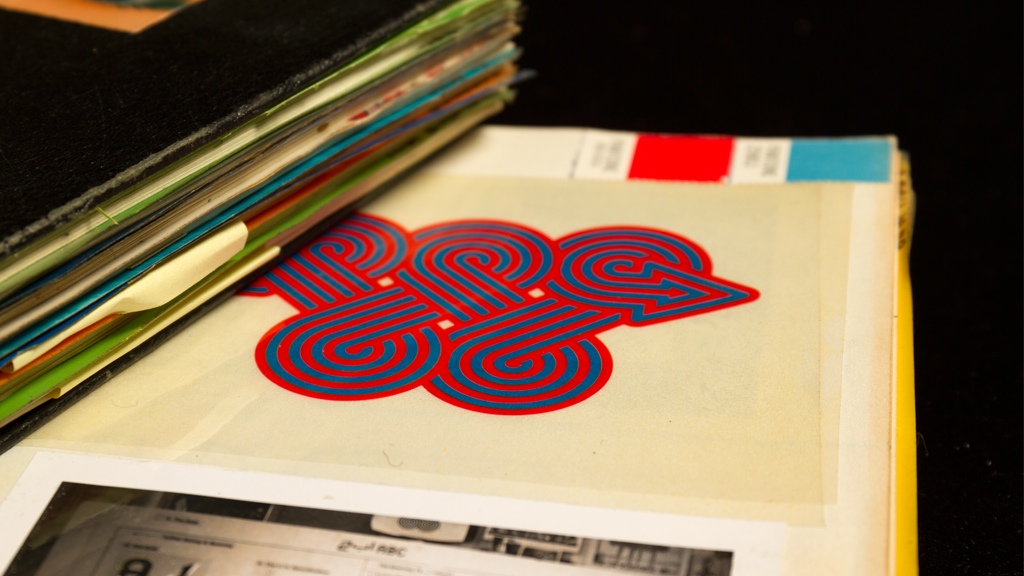
What's the project this week?
Lance Wyman: The Visual Diaries 1973—1982. We've put $20 in as a non-reward backer
Who is the Creator?
What do they have to say about the project?
Every day Lance Wyman documents his creative process in his black “designlogs”. Help us publish Lance Wyman: The Visual Diaries.
What caught your eye?
If you're a design nerd, you can picture the 1968 Mexico City Olympics logo without much mental effort. That's a good graphical identity system, when you can evoke it 48 years later without much effort. It's infamous, now, and referenced in popular culture occasionally. Not many people can make work this iconic and memorable, but Lance Wyman, who designed the logo, sure did.
Wyman kept a continuous series of sketchbooks — his "designlogs" — and now, for the first time, they're being collected, edited, and presented in a handsome edition.
Why should I back it?
Well, if you're not already clicking over to back it, then there's probably not an argument I could make to convince you. You're either a design nerd or you're not. If you are excited? Did you know that Lance Wyman is coming to Seattle to speak at Typecon? Here's a chance to see the man in person talk about his craft.
How's the project doing?
at 71%, with 26 days left, I think they'll be fine without you, so don't feel obligated. Get it because you can't resist.
Do they have a video?
Kickstarter Fund Stats
- Projects backed: 33
- Funds pledged: $640
- Funds collected: $580
- Unsuccessful pledges: 1
- Fund balance: $400
Women are from Mars
Published August 19, 2016, at 11:30am
There's still room in your summer reading lists for a novel about a strong female lead who smuggles herself onto a spacefaring boat, right?
The Help Desk: Flushing out bathroom books
Every Friday, Cienna Madrid offers solutions to life’s most vexing literary problems. Do you need a book recommendation to send your worst cousin on her birthday? Is it okay to read erotica on public transit? Cienna can help. Send your questions to advice@seattlereviewofbooks.com.
Dear Cienna,
Every once in a while I’ll visit someone’s house and see that they have a book, or a basket full of books, on the back of their toilet. I guess this is supposed to be hospitable or something, but all I can think about is how poo-encrusted those books must be.
I’m tempted to steal one of the books from a friend’s house during a party, put it under a microscope, and then mail a photograph of the fecal matter particles to my friends anonymously. But that would be too passive-aggressive, even for Seattle.
But it is disgusting, right?
Colin, First Hill
Dear Colin,
Please don't stop with one book. Also take samples of your host's toothbrush, decorative soaps, air plants, privacy blinds – everything in the bathroom that isn't nailed down. And don't stop with one friend – repeat this process at multiple friends' homes. Then, in the name of fairness, I need you to stare straight into the brown eye of the beast and fecal test yourself, Colin – hands, neck, lips, fleshy pad of the buttocks. This will add credibility to what those in the unscientific community might call your “pervert games.”
And you're right: Mailing your findings is passive aggressive – and no fun! You want to be present, watching your friends' faces as they realize how you've chosen to amuse yourself while an invited guest in their homes. Here is what you do to deliver those results with style: Host a Halloween party. Dress up as a proctologist. Hand deliver results to your guests, in ascending order of least- to most fecally. To offset the creepiness of your actions, give out full body condoms, DIY fecal testing kits and jars of artisanal bleach as prizes.
Kisses,
Cienna
Portrait Gallery will be back soon!

Christine Marie Larsen will be back soon with more amazing portraits!
For now, you can check out her previous work in our Portrait Gallery archives. Stay tuned for her return.
M.A.Orthofer at the Literary Saloon notes that the New York Times has consolidated all of its book review coverage — in the daily paper and in the The New York Times Book Review — under the purview of Pamela Paul. It's perhaps easy to bemoan every new change in the world of journalism as a mistake, but, uh, I think this is a mistake.
One of the consistent pleasures of reading the New York Times was finding book reviews in the paper that disagreed with book reviews in the Book Review. I used to love those intercenine moments when the institution disagreed with itself; to me, they highlighted one of the most important parts of reviewing: the fact that every review is subjective, and that it's possible for even employees of a single august institution to have differing opinions on a work of art. Now that the book reviews are all under one set of watchful eyes, I bet those moments of dissonance will never happen again, which is a real pity.
This morning, Gawker.com — the popular news site that started as a publishing industry gossip blog — confirmed rumors that it will shut down next week. This would be a great time to read Brian Abrams's ebook Gawker: An Oral History, which was published last summer. I reviewed that book when it was released last year.
Thursday Comics Hangover: Cruising for nerds
Above all else, most superhero comics should aim to be entertaining. Sure, it’s nice if you get some commentary in there, or a little bit of a political message, but superheroes aren’t the ideal messengers for heavy themes. (Sorry, people who think The Dark Knight Returns counts as deep political satire.) By the entertainment-per-page ratio, Portland author Chelsea Cain’s run on the Mockingbird series for Marvel is leading the superhero pack these days.
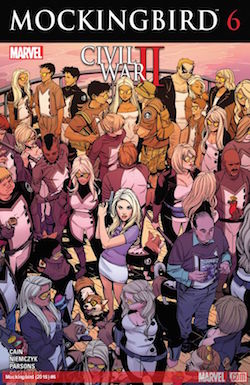
This issue of Mockingbird ostensibly ties in to Marvel’s grating and graceless summer crossover, Civil War 2, but all you really need to know going in is that Mockingbird’s ex-husband, Hawkeye, is on trial for the murder of the Hulk, and the cruise is hosting a large contingent of Hawkeye fanatics. Any woman who has found herself in close quarters with hundreds of nerds dressed up like her ex-husband will be able to relate to this truly universal situation.
Penciller Kate Niemczyk and inker Sean Parsons are intensely interested in making every single background character their own human being, which makes scenes at a Dungeons & Dragons tournament especially fun to read. The lettering, however, is pretty ugly: extra-dialogue elements like a crowd’s chanting and spy-to-English translations are represented in multiple ugly fonts that float on the page, unmoored to the rest of the comic in an annoying way. Some pages look like someone used the “Draw On” tool in MacPaint to slap a few elements on top of otherwise professional work.
The rest of Mockingbird is geared toward maximum reader entertainment, with jokes and clever asides and misdirections. But toward the beginning of the book, as Mockingbird boards the ship surrounded by nerds greeting each other with Vulcan salutes, the observes that she’s alone in a crowd: “If I had hoped to get away from my ex-husband’s troubles, I had come to the wrong place. The good news was, I didn’t need the disguise. Hawkweye fans? They like to pretend I don’t exist.” It’s a clever commentary on the fact that superhero comics fans tend to marginalize and ostracize women characters (and the fans who dress up like them) from their culture. Maybe there’s more to these superhero comics than just entertainment, after all.
This is not the first time this has happened:
Barnes & Noble just unceremoniously ousted Ronald Boire as CEO, saying that the board has deemed him “not a good fit for the organization and that it was in the best interests of all parties for him to leave the Company.”
Boire was at the top of the chain book retailer for less than a year. This puts longtime Barnes & Noble leader Leonard Riggio back in charge of the chain that he founded in 1965 and has led, on-and-off, ever since. Riggio was set to retire next month, which makes him yet another victim of retirony.
Will Barnes & Noble ever find someone to lead it into the future? Or will Riggio have to permanently postpone his retirement in order to keep the retailer on life support? Barnes & Noble's demise would create a depressing number of brick-and-mortar "bookstore deserts" in rural and suburban parts of America; the cultural stakes are way too high. At this point, even most independent booksellers I know are cheering on Barnes & Noble's continuing survival. Let's hope they figure it out.
In 9 Ounces, Anastacia Renee Tolbert transforms monologues into conversations
Luna, Alice, and Saraphina fill the stage with both humor and anguish. Three friends living in the same building, they work on their downward dog together and help each other through life’s daily struggles. The performance in 9 Ounces presented the separate monologues of these three black women — each one an act and each role performed by Anastacia Renee Tolbert, the Hugo House's current poet-in-residence. In part, the characters serve to represent the span of life and its various stages through their age differences: Luna is a kid, Alice an adult, and Saraphina a 91-year-old widow. Their unusual friendship also demonstrates Tolbert’s belief that generation gaps and age expectations shouldn’t dictate what we do or who we see. Tolbert donned each persona naturally and switched between them with ease, giving them distinct outfits, different voices, and unique mannerisms. Each character has the therapist-appointed task of talking to their reflection in the mirror (the audience). The result is a self-aware and brutally honest string of ideas and thoughts, sometimes expressing self-consciousness, sometimes criticizing society, and sometimes just trying to be okay.
Common threads bound these women together and linked the show’s acts, making the narrative more cohesive. They share a physical location — living in the same co-op — but more importantly they share an overwhelming and inescapable fear, manifested in their repetitions of “it could happen to me.” Luna, Alice, and Saraphina voiced their fears with infectious conviction, and this unnerving thought — “it could happen to me” — rippled through the audience, amplified by the small, personal setting of the performance.
The monologues included hilarious moments, meditative moments, and solemn moments. But underlying every moment of these black women’s lives is a visceral feeling of being unsafe, whether in a park or in a knitting group or while cooking fried chicken. Saraphina laments, “I am 91 and don’t feel safe still in this world”; Alice repeats her mantra to “keep it moving” when every day “people who look like you are dying”; young Luna admits, “I feel safe inside my co-op… most times. Sometimes. Not this week.” Part of what made the show so forceful was the freedom Tolbert had in terms of performing. In a small room behind the Twilight Gallery in West Seattle, she lit cigarettes and removed clothing, adding layers and layers of depth to her characters. She screamed at the top of her lungs, she cursed, she cried. Tolbert did not hold back, and that’s what made her one-woman show so special. The all-out mentality fueling the characters’ monologues made every joke funnier and every social criticism sting more. Behind hilarious storytelling of daily happenings and other humorous rants were the points that making human connections today is increasingly difficult, that sanity can easily slip out of our grasp, but above all that each day is a struggle as a woman of color. Tolbert’s performance filled the small space with a raw intensity I’ve witnessed few times before. Her show was poignant, tear-jerking, and critical, but it was more than mere adjectives.
The follow-up Q&A was just as important as the performance. I can tell you what was there: a few people; the show’s colorful set; and Tolbert’s art installation with poems tacked on the walls and jars of hair with arrows and notes (“Black hair (natural) — great for appropriation”). But what wasn’t there (until it was finally extracted from the audience, like pulling teeth): a conversation. A conversation about race, the main theme of this over-two-hours show. Those present — myself included — skirted around the most important subject and the glaring theme of feeling unsafe, until at last Tolbert’s friend and the night’s MC voiced her chagrined comment that rightfully called us all out and started the exchange of unrestrained comments and insights. The entire experience highlighted the presence of violence and the absence of conversations, the visible and invisible issues.
Your Week in Readings: The best literary events from August 17th - August 23rd
Wednesday August 17: Reporting the Oregon Story
Floyd McKay has been a character in Northwest media for about as long as there’s been a Northwest media, appearing as a political reporter for KGW-TV and writing for the Seattle Times and Crosscut. His new book is an account of the history of politics and media in the Northwest. Third Place Books Lake Forest Park, 17171 Bothell Way NE, 366-3333, http://thirdplacebooks.com. Free. All ages. 7 p.m.Thursday August 18: Sun Bear
Matthew Zapruder is more than just a renowned local poet — he’s also an editor at the second best poetry publisher in the region, Wave Books. And he has a new collection coming out from the first-best poetry publisher in the region, Copper Canyon Press. Help him celebrate the release of Sun Bear, which is an awesome title.. Elliott Bay Book Company, 1521 10th Ave, 624-6600, http://elliottbaybook.com . Free. All ages. 7 p.m.Friday August 19: Hugo House Housewarming Party & BBQ
You probably know that the Hugo House space on 11th Ave is now a deep hole in the ground. But have you visited the House’s temporary location while their new facilities are being built? Tonight, they’re making it easy by hosting a BBQ and housewarming with free sausages from nearby George’s Delicatessen and $1 cans of PBR. Hugo House, 1021 Columbia St., 322-7030, http://hugohouse.org.. Free. All ages. 4 p.mSaturday August 20: Wong/Akbar/Peñaloza/Lewis
See our Literary Event of the Week column for more details. Elliott Bay Book Company, 1521 10th Ave, 624-6600, http://elliottbaybook.com . Free. All ages. 7 p.m.Sunday August 21: Southwest Stories
Chief Seattle’s great-great-great-great-grandson, Ken Workman, will discuss the history of West Seattle, the future of the Duwamish peoples, and he’ll also host a lively question-and-answer session. It is not every day that you get to hear a history of this land directly from someone representing the people who were here before colonization began Delridge Library, 5423 Delridge Way SW, 773-9125, http://spl.org. Free. All ages. 2 p.m.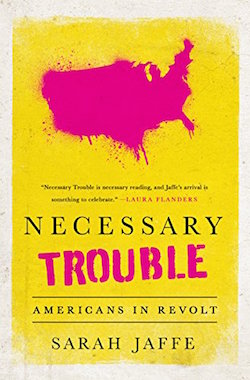
Monday August 22: Necessary Trouble: Americans in Revolt
America was built on revolution, and our Constitution allows for argument as a part of the process. This gives us a natural advantage over, say, France. Sarah Jaffe’s newest book is a history of American revolutions, from those early days in New England up through Black Lives Matter and the fight for $15. Seattle Public Library, 1000 4th Ave., 386-4636, http://spl.org. Free. All ages. 7 p.mTuesday August 23: Words to Color By
Certain literary snobs like to mock coloring books for adults, but fuck those guys. Coloring makes people feel good, the books are helping the bottom lines of indie bookstores, and they’re fun. Tonight, local artist Jennifer Lankenau hosts a debut and coloring party for her first coloring book. University Book Store Mill Creek, 15311 Main St., 425-385-3530. ubookstore.com. Free. All ages. Noon.Literary Event of the Week: Wong/Akbar/Peñaloza/Lewis
As you know, we at the Seattle Review of Books publish a poem by a Seattle poet every Tuesday at 10 am. We always ask the featured poet to then choose the poet who we’ll feature on the next Tuesday. It’s a chain of Seattle poetry, made up of friends, fans, and acquaintences who’ve shared some laughs on the open-mic circuit. When I asked Seattle literary demigod Sherman Alexie to kick off our spring/summer 2016 poetry chain, I was intensely curious to see who he’d choose as the poet to succeed him. Out of all the poets in Seattle, who would Alexie spotlight?
Alexie’s decision was fast and decisive: Jane Wong. It was perhaps a surprising choice, if you expected Alexie to prop up some sort of a Literary Old Boy’s Network. Wong has been reading around town for a while now and she’s been collected in outlets like (the Alexie-edited) Best American Poetry 2015 and the Best New Poets 2012, but she doesn’t have many books to her name yet — just three chapbooks and a debut collection, Overpour, coming out from Action Books this coming fall.
But read Wong’s poetry and you’ll see why so many writers in town advocate for her. Consider “Apology in the Age of Construction,” the poem she published with us after being selected by Alexie. It opens with an incredibly striking image:
We can only recall the freak accidents:
the lightning bolt hitting the right arm
at a right angle, the bees pouring
from an overturned truck, the crocodile
that escaped on a lawn, sipping lemonade.
Those disasters are so unique, so particular, that each one could be its own short story. (At least the bee-filled truck is based on a real-life incident — a 2015 accident in which an overturned truck dumped 14 million bees on I-5. ““Everybody’s been stung,” a state trooper told the Seattle Times at the time.) You can see the cool yellow of the lemonade against the foggy emerald of the crocodile’s skin, the person spinning (to the right, and to the right again) after being struck by lightning.
But Wong expands outward from there to the Seattle outside our windows right now, casting her eyes on the intentional destruction that comes before construction. (“We laid down layers/of asphalt in the tradition of weavers.”) She looks at the skyline full of cranes and sees, simultaneously, a slow-motion accident and an unfolding possibility and a bizarre kind of playground:
In the early morning, we mistook snow
for falling specks of paint, a construction
site for an amusement park.
Look at a construction site without context and you see what looks like a combat zone. Look at a new building and you see a blank canvas. Look at a disaster the right way and you can find unexpected beauty. Tilt your head just right and you can hear Sherman Alexie laughing with surprise and delight at the way Wong cheerfully turned everything on its ear.
This Saturday at Elliott Bay Book Company, Wong is headlining a reading with two poets from Tallahassee — Kaveh Akbar and Paige Lewis — and Seattle poet Michelle Peñaloza. It’s a can’t-miss affair.
Hunter S. Thompson's widow, Anita, just returned a pair of antlers that Thompson stole from Ernest Hemingway's house about three years after Hemingway committed suicide. This story touches on so many high school boy writer wannabe zones of interest that it's not even funny: Thompson, Hemingway, theft, the ironic display of hunting trophies.
But let's be clear so all the wannabe gonzo journalists in the back can hear us: stealing objects from the home of your idols is not okay.Please don't walk into Thompson's house and try to steal his gong. You might get arrested, for one thing, and for another thing, the odds are good that even if you do get away with it, you're not going to have a widow as cool as Anita Thompson to do the right thing on your behalf after you're gone.
Help Ted Rall fight the L.A. Times
When I talked with cartoonist Ted Rall at Town Hall last year, he openly discussed his legal troubles with the Los Angeles Times. His side of the story is around the 28 minute mark in the video below:
Basically, Rall says that the chief of the LAPD and the editors of the LA Times colluded to fire him. Rall filed a suit against the Times to clear his name, which means he's now in direct combat with the much-loathed media conglomerate Tronc. Unfortunately, in order to bring the suit to court, he needs to provide a $75,000 bond by tomorrow afternoon. And he is running a Go Fund Me campaign to raise the funds.
If the case goes to trial and Rall wins, he's promising to return the money from the bond (minus the 5% Go Fund Me processing fee and a 2% bonding fee) but that will take a lot of time. Please don't contribute any more than you have to spend, but if you do have extra funds to spend, maybe consider helping Rall out?
I realize that in this day and age it feels almost counterintuitive to ask people to contribute to fight against a newspaper, but this is an important case that touches on corporate ownership of newspapers, institutional friendliness between the news and the people the news should be covering, and media accountability. If you have the money to spare, maybe help Rall make a stand?
....Outliers, by Malcolm Gladwell. A book club for Seahawks players is the idea of defensive end Michael Bennett, who got approval from management. Bennett says his teammates seem interested, and he thinks it will be "pretty cool." Bennett discusses the importance of reading with his teammates a lot: "I tell them don’t waste too much time staying on the phone all the time. Every once in awhile, open up a book."
Zac shares an acute observation
From the other-sided, alee the valley; to give what you want —
says the mentor, irreparably. As pretense gets wrecked like a
photograph. As we haunt eternally.It's hard to tell.
Do we?Cold guy drifts in cold veins, this nightly swim.
So I overheard in LA, grab a shovel, LA is dead.
Nothing is Real. Lame,I know. Ask if there's proof.
Of life, if not for death's warming the carpet living room.I'm officially bored with weed,
as if a backpack with nothing in it. As if I hope the world is done
sleeping in synchronicities.Are there heavenly capillaries networking? Blacked-out to neon.
Who is recording
our untitled hallucinations: washed up on the amethystine sea he plunged,and what of the notes nailed to the roof with a gun? Days of
noise funneling into the hollows
of my hips. A lot of beating hearts out there. As they say, imitation
is suicide, you lowlife.
Mail Call for August 15, 2016
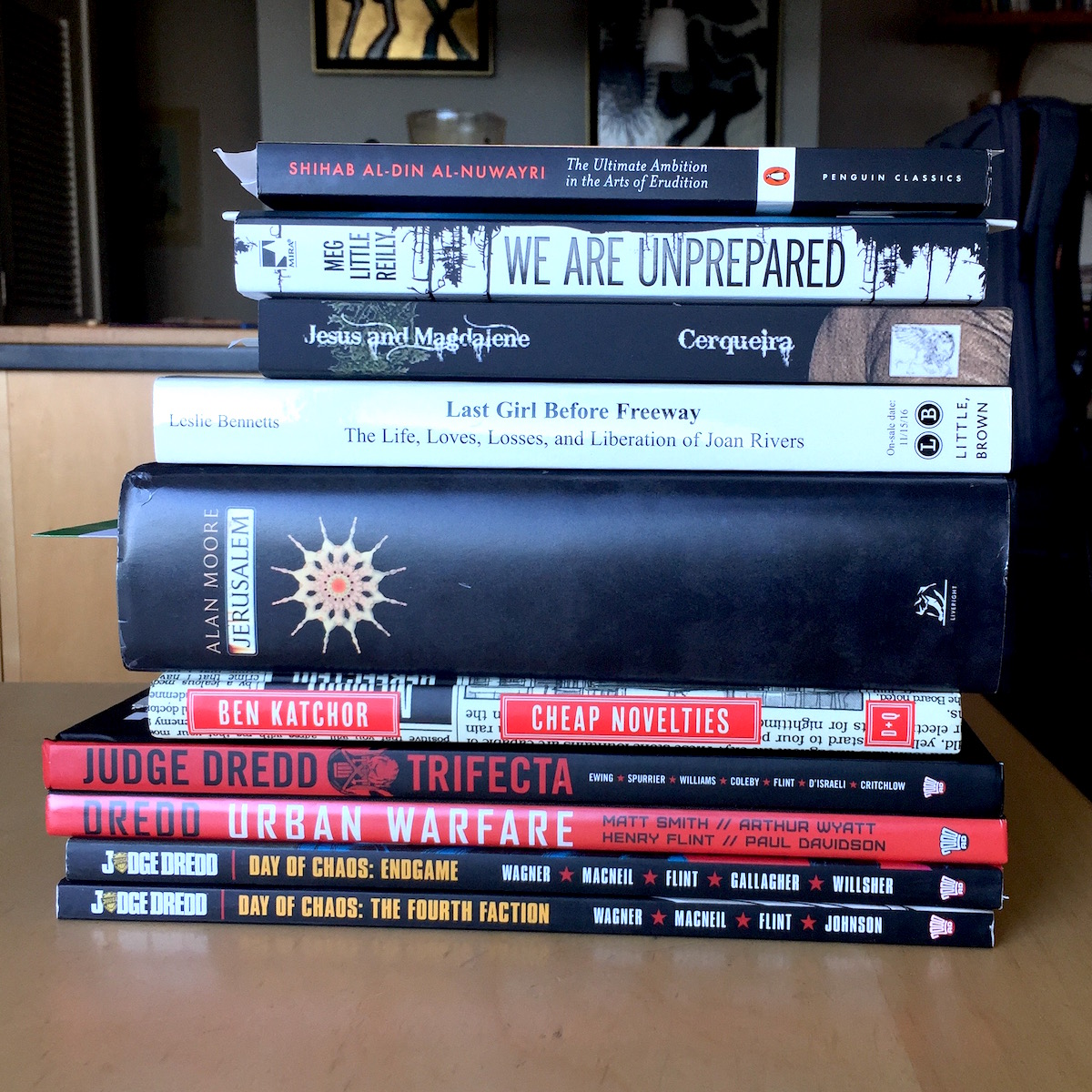
The book "Cheap Novelties: the Pleasures of Urban Decay" came with a cool newspaper!

Seattle poet EJ Koh announced on Twitter that her poetry collection A Lesser Love has won the 2016 Pleiades Press Editors Prize for Poetry. The book will be published next year.
If you'd like to learn more about Koh, we published her wonderful poem "Korean War" last fall, and she will be a featured reader — along with poet Robert Lashley and Seattle author Sherman Alexie — at the Seattle Review of Books reading at Bumbershoot this year.
A fascinating life, a fascinating book of stories
Sponsor Roy Lisker has done it all: he's a mathematician, political activist, underground journalist, prankster and provocateur, as well as playwright, poet, and writer of fiction. Sagging Meniscus Press has pulled together this first volume of Lisker's collected stories: "We regard the publication of these stories, all together for the first time, as an important event in American letters."
We have the start of his story "Amplitude of the Cosmos" on our sponsor's page, and it's wonderful work, complex, rhythmic, with a melodic rhyme and lilt, a formalist repetition that provides mood and music in the prose. It's worth your time to click through and familiarize yourself with Lisker's work, if you're not already a fan.
It's thanks to sponsors like Roy Lisker, and readers like you, that we're able to keep the pixels lit up here at the Seattle Review of Books. We've just released our next block of sponsorship opportunities. Check them out on the sponsorship page, and grab your date before they're gone.
Meet the new writers at Hugo House
In the news business, they refer to the "Friday evening news dump" as the time when organizations — corporations, governments — release information that they don't want to get much attention. Friday evenings at 5 pm in the summer are generally when disgraced CEOs step down, when embarrassing statistics are released, when institutional shame is released into the world. Friday news dumps in August and December are especially notorious for this, because absolutely nobody pays attention to the news over the weekends in summer or the holiday season.
I have no idea why the Hugo House decided to release this good news on an August Friday news dump, so I'm bumping it up to Monday prime-time: The newest Hugo House Writer-in-Residence is Sonora Jha. Jha is a writer whose debut novel — Foreign — was published in English by Random House India. It has still not been released in the United States, though Elliott Bay Book Company often has imported editions of Foreign in stock through an exclusive deal.
Jha teaches journalism and media at Seattle University, and she's hard at work on her memoir, This Little Matter of Love, which she says is about "raising a boy (my son) to be a feminist, and the struggle of taking him to my estranged 'home' in India on the threshold of his departure for college." It is one of the more anticipated books by a Seattle author that I can think of, and Jha will be finishing her work on the book as the House's writer in residence. She will also be providing office hours at the House so that young and inexperienced authors can contact her for help with their own manuscript, and she will undoubtedly be appearing at quite a few Hugo House readings throughout her yearlong tenure as Writer in Residence. Jha has been an active member in the literary community, but she has still kept a fairly low profile; I can't wait for Seattle to meet her through this new position.
Additionally, the Hugo House announced their newest class of Made at Hugo Fellows, a great program that gives emerging Seattle writers access to the House's many education programs, a series of spotlight readings, and access to a comunity of like-minded peers. The Made at Hugo Program is one of the best things the Hugo House does. This year's recipients are:
...poet and writer Gabrielle Bates; queer transgender poet and performer Raye Stoeve; writer and memoirist Katie Lee Ellison, writer and co-founder of the annual small press and independent publishing festival APRIL, Willie Fitzgerald; multilingual poet Shankar Narayan; and writer Beryl Clark
Fitzgerald, of course, is familiar to SRoB readers both for his role with APRIL and for his terrific review of Roberto Calasso's The Art of the Publisher. We can't wait to meet the rest of these new faces at upcoming Hugo House events.
Bookstore of the Month: Why does Seattle have so many great authors for children?
If you’ve published a kids’ book and you live in Seattle, the odds are good that you’ve been to Secret Garden Books. Either you’ve stopped by and introduced yourself because you know they have a rapt audience of children who pay close attention to their recommendations, or they’ve hosted your book launch party. The fact is, though Seattle is home to many terrific bookstore sections for young readers — Elliott Bay Book Company’s children’s section improved exponentially when the store moved from Pioneer Square to Capitol Hill; University Book Store has always had an incredibly diverse selection of titles and an adoring staff — Secret Garden is the city’s headquarters for children’s literature.
Secret Garden has had a long and mutually beneficial relationship with the western Washington chapter of the Society of Children’s Book Writers and Illustrators (SCBWI), an international organization which “acts as a network for the exchange of knowledge between writers, illustrators, editors, publishers, agents, librarians, educators, booksellers and others involved with literature for young people.” Secret Garden booksellers attend monthly meetings of the SCBWI and engage in book talk with members on a regular basis. Agents and art directors from the New York publishing industry drop by meetings to keep in touch with the local chapter and to see what Secret Garden booksellers are loving these days.
Secret Garden’s events coordinator, Suzanne Perry, says the local chapter of the SCBWI “is the best one in the country.” It’s a very active organization that hosts meetups, webinars, and serves as a resource for all the readings, classes, and networking opportunities that local writers and artists and lovers of children’s literature need to know.
Why is the western Washington SCBWI so strong? Probably because the Seattle area is home to a large number of fantastic children’s book authors and illustrators. Perry has so many Seattle-area favorites she has to stop our interview every few minutes to add someone she forgot. She cites “super, super, super strong authors” like Martha Brockenbrough, Justina Chen Headley, Dana Sullivan, and Ben Clanton. Perry also likes an up-and-coming author named Kim Baker, adding “she only has one middle grade book out now, but she’s got a great future ahead of her.”
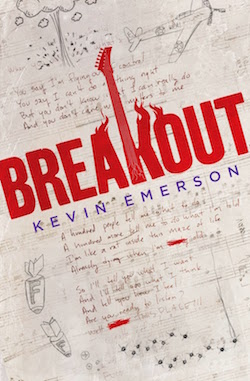
Is there anyone Perry doesn’t like? She says there was a local children’s author who published a book for adults. That by itself is no problem, but she says that when he was writing the adult book, “he was going around saying he was writing a real book, and I stopped loving him.” The moral of the story: children's books are every bit as real as books for adults, and don't you forget it.